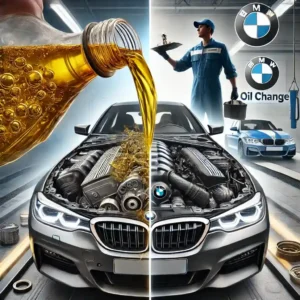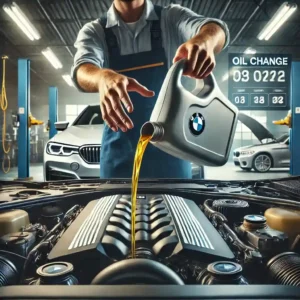BMW Oil Change: 7 Key Signs You’re Overdue Take Action Today
The BMW engineers designed your vehicle to achieve exceptional performance and luxury features. All modern engines depend on basic yet essential engine oil for operation. Not performing BMW oil changes will result in expensive repairs in combination with performance deterioration and potential engine failure.
This complete guide explores both the importance of oil changes and the indicators of oil change needs and methods to maintain your BMW’s longevity.
Table of Contents
ToggleWhy BMW Oil Changes Are Crucial
The BMW engine functions as a precise mechanism that operates at high speeds and under challenging driving situations. Your automobile depends on engine oil as its vital fluid which serves both as lubrication and as its vital fluid. The need for BMW oil changes remains an absolute necessity for various reasons.
Engine Lubrication and Protection
The lubricating properties of oil reduce the friction that occurs between moving parts to prevent mechanical wear and overheating. When fresh oil is absent from the system components such as pistons and crankshafts start rubbing against each other resulting in costly BMW engine repair expenses.
Enhanced Performance
Clean oil ensures optimal fuel efficiency and horsepower. Dirty oil thickens over time, forcing the engine to work harder and reducing acceleration.
Longevity of Your BMW
Your engine will last for many decades longer because of regular oil changes. BMW vehicles demonstrate long-lasting properties yet they demand regular maintenance as all luxury automobiles do.
Warranty Compliance
Skipping oil changes can void your BMW’s warranty. Dealerships require proof of routine maintenance for coverage on common BMW repairs.
7 Key Signs Your BMW Needs an Oil Change
Don’t wait for a breakdown! Watch for these red flags:
1. Dark or Gritty Oil
Fresh oil is golden and translucent. Over time, it collects dirt, metal particles, and sludge, turning dark and gritty. How to check:
- Stop your vehicle on flat terrain before waiting for 10 minutes following engine shutdown.
- Utilize the dipstick to measure the oil level by following these steps: first, extract it from the engine, clean it thoroughly, put it back in, and then analyze both color and oil position.
If it’s below the “MIN” mark or looks like coffee grounds, schedule a BMW oil change immediately.
2. Engine Knocking or Ticking
The oil acts as a cushion between metal parts. When it degrades, you’ll hear metallic knocking or ticking noises a precursor to catastrophic engine failure.
3. Oil Change Warning Light
Modern BMWs have intelligent sensors. If the oil can icon or “Service Due” message appears, heed the warning. Ignoring it risks BMW’s electrical system malfunctions or engine damage.
4. Blue or Gray Exhaust Smoke
Thick smoke signals oil burning in the combustion chamber. This often points to worn piston rings or valve seals a problem tied to neglected oil changes.
5. Declining Fuel Economy
Sludgy oil increases engine strain, dropping fuel efficiency by up to 2%. If your gas mileage plummets, an oil change might restore it.
6. Burning Oil Smell in the Cabin
A smoky odor inside the car indicates an oil leak in hot engine parts. This fire hazard demands urgent attention.
7. Mileage Beyond 7,500–10,000 Miles
BMW recommends oil changes every 7,500–10,000 miles for most models. If you’ve crossed this threshold, don’t delay even if your car “feels” fine.
How Often Should You Change Your BMW’s Oil?

BMW recommends vehicle owners replace their oil between 7,500–10,000 miles yet actual driving behavior remains the primary factor in determining oil lifetime.
- City Driving: Stop-and-go conditions in city driving speed up oil deterioration. Change every 5,000–7,000 miles.
- High-Performance Driving: Track days or aggressive driving? Opt for 5,000-mile intervals.
- Extreme Weather: Subzero winters or scorching summers? Synthetic oil handles these better but still needs frequent changes.
Pro Tip: Pair every BMW oil change with an oil filter replacement. A clogged filter can’t trap contaminants, defeating the purpose of fresh oil.
Synthetic vs. Conventional Oil: Which Is Best for Your BMW?
BMW engines thrive on synthetic oil, and here’s why:
| Factor | Synthetic Oil | Conventional Oil |
| Performance | Flows better in the cold, resists heat | Thickens in cold, breaks down |
| Longevity | Lasts 10,000–15,000 miles | Needs changes every 5,000 miles |
| Engine Protection | Reduces deposits, prevents sludge | More prone to oxidation |
While synthetic costs more upfront, it saves money long-term by preventing BMW engine repairs. Always check your owner’s manual some models, like the M Series, require specific synthetic grades.
Professional Oil Changes: Peace of Mind
Certified BMW technicians:
- Use factory-approved oil and filters.
- Inspect for leaks, worn belts, or BMW suspension repairs.
- Update your vehicle’s service history crucial for resale value.
Seasonal Maintenance Tips for BMW Owners
- Winter Prep:
- Switch to low-viscosity synthetic oil (0W-20) for cold starts.
- Check the battery and BMW electrical system—cold strains both.
- Summer Prep:
- High temps thin oil; ensure it’s not overdue.
- Inspect cooling systems to prevent overheating.
- Year-Round:
- Rotate tires and inspect brakes during oil changes to avoid critical BMW brake repairs.
Conclusion:
Your BMW isn’t just a car it’s an investment in performance and prestige. Regular BMW oil changes are a small price to pay to avoid catastrophic repairs, whether it’s a seized engine or BMW suspension repairs. By recognizing the 7 key signs of overdue oil changes and adhering to a strict maintenance schedule, you’ll ensure your BMW delivers the thrill of driving it was built for.
Ready to act? Book your BMW oil change today at The Car Lab Auto Repair Center!
Frequently Asked Question
Can I extend oil change intervals with synthetic oil?
Yes, but never beyond 15,000 miles. Severe driving conditions still require 7,500-mile changes.
Does BMW cover oil changes under warranty?
Only during the included maintenance period (typically 3 years/36,000 miles).
What if I accidentally use conventional oil?
Drain it immediately! Conventional oil lacks additives to protect BMW’s turbocharged engines.

Address
24b street, Al qouz Industrial area 2, Dubai


Phone
+971 4 3365597


info@thecarlab.ae
Services
Contcat Us
-
800 8257
-
+971 4 3365597
-
info@thecarlab.ae
-
24b street, Al qouz Industrial area 2, Dubai
-
Open daily from 8:00 am - 8:00 pm
-
24/7 Customer Care Service

